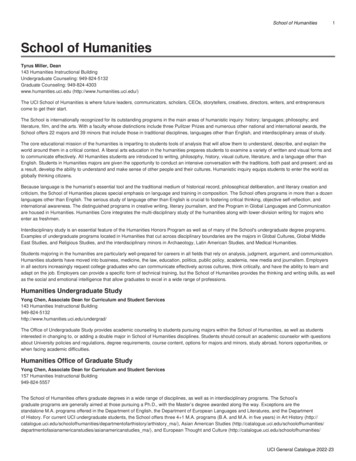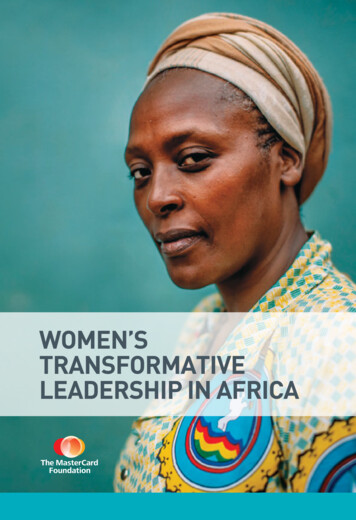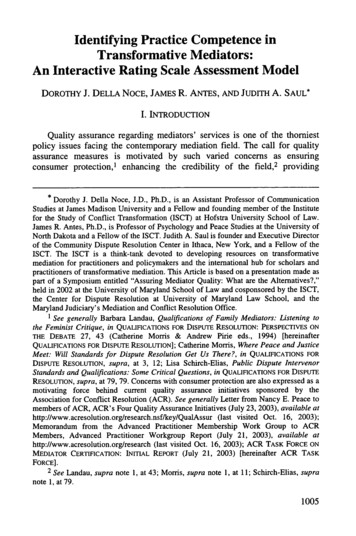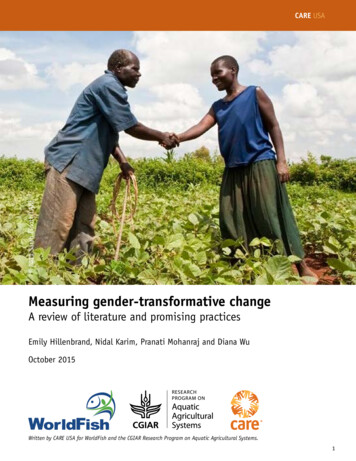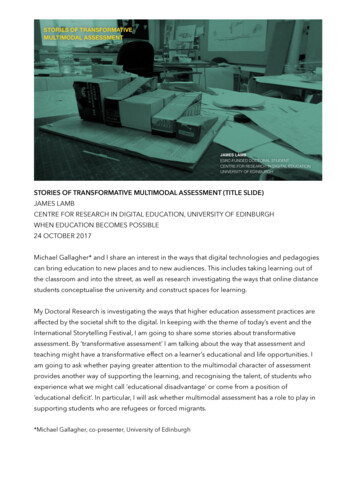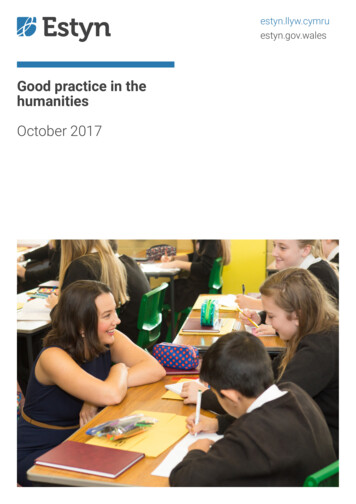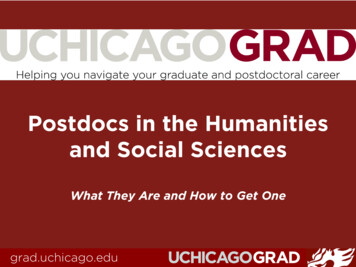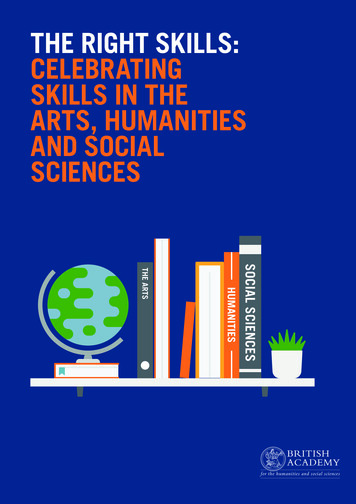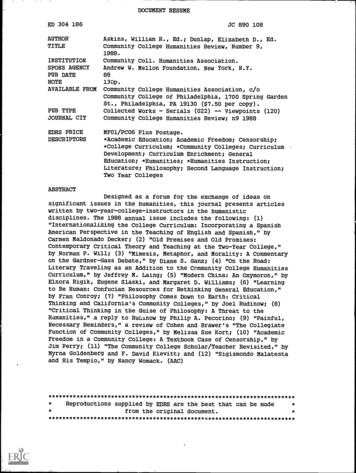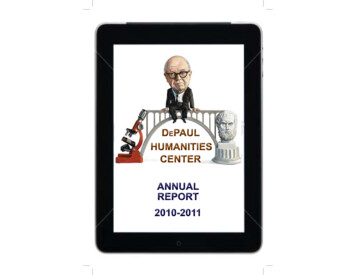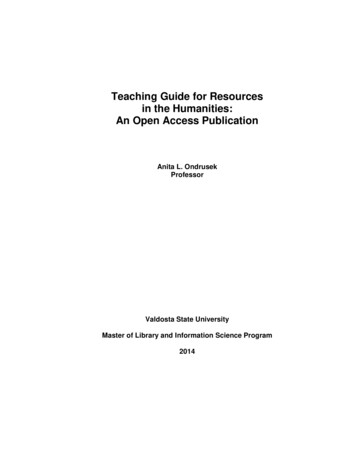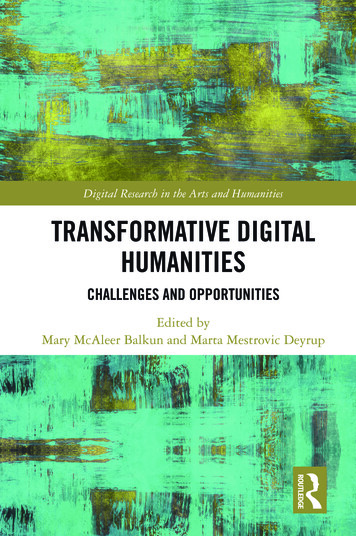
Transcription
Transformative Digital HumanitiesTransformative Digital Humanities takes a two-pronged approach to the digitalhumanities: it examines the distinct kinds of work currently being undertaken inthe field, while also addressing current issues in the digital humanities, includingsustainability, accessibility, interdisciplinarity, and funding.With contributions from humanities and LIS scholars based in China, Canada,England, Germany, Spain, and the United States, this collection of case studiesprovides a framework for readers to develop new projects as well as to see howexisting projects might continue to develop over time. This volume also participates in the current digital humanities conversation by bringing forward emergingvoices that offer new options for cooperation, by demonstrating how the digitalhumanities can become a tool for activism, and by illustrating the potential of thedigital humanities to reexamine and reconstitute existing canons.Transformative Digital Humanities considers what sorts of challenges still existin the field and suggests how they might be addressed. As such, the book will beessential reading for academics and students engaged in the study of informationscience and digital humanities. It should also be of great interest to practitionersaround the globe.Mary McAleer Balkun is Professor of English, Director of Faculty Development,and co-chair of the Digital Humanities Committee at Seton Hall University. Sheis also co-chair of the New Jersey Digital Humanities Consortium. She is theauthor of The American Counterfeit: Authenticity and Identity in American Literature and Culture (2006) and co-editor of three books.Marta Mestrovic Deyrup is Professor/Outreach and Humanities Librarian atSeton Hall University Libraries, co-chair of the Digital Humanities Committee,and co-chair of the New Jersey Digital Humanities Consortium. She is the editorof Digital Scholarship and the author or editor of eight other books and numerousarticles on scholarly communication, Slavic librarianship, and information-seekingbehavior.
Digital Research in the Arts and HumanitiesSeries Editors: Marilyn Deegan, Lorna Hughes,Andrew Prescott, Harold Short and Ray SiemensDigital technologies are increasingly important to arts and humanities research,expanding the horizons of research methods in all aspects of data capture, investigation, analysis, modelling, presentation and dissemination. This important seriescovers a wide range of disciplines with each volume focusing on a particular area,identifying the ways in which technology impacts on specific subjects. The aim isto provide an authoritative reflection of the ‘state of the art’ in technology-enhancedresearch methods. The series is critical reading for those already engaged in thedigital humanities, and of wider interest to all arts and humanities scholars.Humans at Work in the Digital AgeForms of Digital Textual LaborEdited by Shawna Ross and Andrew PilschFeminist War Games?Mechanisms of War, Feminist Values, and Interventional GamesJon Saklofske, Alyssa Arbuckle, and Jon BathThe Power of NetworksProspects of Historical Network ResearchEdited by Florian Kerschbaumer, Linda von Keyserlingk, Martin Stark andMarten DüringTransformative Digital HumanitiesChallenges and OpportunitiesEdited by Mary McAleer Balkun and Marta Mestrovic DeyrupMedieval Manuscripts in the Digital AgeMateriality, Functionality and Cultural ValueEdited by Benjamin Albritton, Georgia Henley and Elaine TreharneFor more information about this series, please visit: Humanities/book-series/DRAH
Transformative DigitalHumanitiesChallenges and OpportunitiesEdited by Mary McAleer Balkunand Marta Mestrovic Deyrup
First published 2020by Routledge2 Park Square, Milton Park, Abingdon, Oxon OX14 4RNand by Routledge52 Vanderbilt Avenue, New York, NY 10017Routledge is an imprint of the Taylor & Francis Group, an informa business 2020 selection and editorial matter, Mary McAleer Balkun and MartaMestrovic Deyrup; individual chapters, the contributorsThe right of Mary McAleer Balkun and Marta Mestrovic Deyrup to beidentified as the authors of the editorial material, and of the authors for theirindividual chapters, has been asserted in accordance with sections 77 and78 of the Copyright, Designs and Patents Act 1988.All rights reserved. No part of this book may be reprinted or reproduced orutilised in any form or by any electronic, mechanical, or other means, nowknown or hereafter invented, including photocopying and recording, or inany information storage or retrieval system, without permission in writingfrom the publishers.Trademark notice: Product or corporate names may be trademarks orregistered trademarks, and are used only for identification and explanationwithout intent to infringe.British Library Cataloguing-in-Publication DataA catalogue record for this book is available from the British LibraryLibrary of Congress Cataloging-in-Publication DataA catalog record for this book has been requestedISBN: 978-0-367-02375-1 (hbk)ISBN: 978-0-429-39992-3 (ebk)Typeset in Times New Romanby Apex CoVantage, LLC
ContentsList of figuresList of contributorsPrefaceviiiixxivM A RY M cA L E ER BAL KUN AND MARTA ME S T ROVIC D EY RU PIntroduction1S U S A N S C H R E I BMANPART IInterventions1 Digital decolonizations: remediating the Popol Wuj57C AT H E R I N E A D DI NGTON, KARI NA A. BAP T I S TA, RA FA ELC . A LVA R A D O , AND AL L I S ON MARGARE T BI GE LO W2 “Throughlines”: social injustice and activism inLos Angeles18M A R I K A C I F O R AND BRI T T PARI S3 Digital humanities and critical engagement: the case of theScottish Corpus of Texts & Speech and Wee Windaes32R A C E M oC H R I D HEPART IIArchitecture/infrastructure4 Augmented reading: digital libraries as proponents ofdigital humanitiesM I C H A E L K I C EY AND JE S S I CA CL E MONS5355
vi Contents5 Specialized information programs as a service forresearchers at German academic libraries65S A N D R A S I M ON AND T I MO S T E YE R6 Dynamic digital humanities projects from ShanghaiLibrary in China79C U I J U A N X I A A ND XUE - MI NG BAOPART IIIA (new) community of practice7 Building transformative digital projects through graduateinternships9193H É L È N E H U ET AND S UZ AN ALT E RI8 Digital humanities preservation: a conversation fordeveloping sustainable digital projects103A . M I L L E R A ND MOL LY TAYL OR- P OL E S KE Y9 Best practices for improving communication in the digitalhumanities120M A R Í A - D O L OR E S OLVE RA- L OBO AND L OL A G A R C ÍA -SA N TIA G O10 Sustaining digital humanities initiatives in challengingtimes133M A RY M cA LE E R BAL KUN AND MARTA ME S T RO V IC D EY RU PPART IVDiscovery and recovery14311 Blending approaches and methodologies: theBibliographical Database for the Historiography ofOttoman Europe (HOE)145V I V I A N S T R OT MANN12 Work from where you are: lessons from an online anthologyof early Florida literatureA L E X A N D R A C URRAN, T HOMAS HAL L OCK, A N D G A RY A U STIN156
Contents13 Growing up digital: European women’s writing and digitalresource developmentvii165Z S U Z S A N N A VA RGAIndex176
Figures5.16.19.19.211.1The data federation architecture of DARIAH-DEChinese ancient books data model for evidence-based researchCore ideas for the design of digital communication strategiesUser-centered digital communication strategiesArchitecture of the HOE application7284121124148
ContributorsCatherine Addington is a Ph.D. candidate in the Department of Spanish, Italian,and Portuguese at the University of Virginia.Suzan Alteri is a rare books librarian and the curator of the Baldwin Library ofHistorical Children’s Literature at the University of Florida. She researches theintersections of children’s literature and science published in the nineteenthcentury and has just completed the bibliographic project Guiding Science. Herwork has been published in Digital Defoe, Education Libraries, and ArchivalIssues.Rafael C. Alvarado is Program Director of the School of Data Science at theUniversity of Virginia. He received his B.A. in Philosophy and Ph.D. in Anthropology from the University of Virginia. A career digital humanist, he has beena contributing developer in several projects, including the Omiti, Charrette,Shahnameh, and Geniza Projects at Princeton University, the House DividedProject at Dickinson College, and the Digital Yoknapatawpha Project at theUniversity of Virginia. He has taught and published in the areas of digitalhumanities and the anthropology of information. His current research focuseson the application of text mining and natural language processing methods tothe social and cultural interpretation of texts.Gary Austin, M.L.I.S., is an Instruction and Reference Librarian at the Universityof South Florida, St. Petersburg.Mary McAleer Balkun is Professor of English, Director of Faculty Development,and co-chair of the Digital Humanities Committee at Seton Hall University. Sheis also co-chair of the New Jersey Digital Humanities Consortium. She is theauthor of The American Counterfeit: Authenticity and Identity in AmericanLiterature and Culture (2006), co-editor of three books, and author of articleson early American literature, pedagogy, and faculty governance.Xue-Ming Bao is Electronic Resources Librarian and Associate Professor at SetonHall University. He became involved in digital humanities projects in 2015. Hevisited ten libraries and schools of information management in five cities inChina from May 21 to July 11, 2017 as a part of his sabbatical leave. Shanghai
x ContributorsLibrary was one of his visiting sites, where Cuijian Xia’s digital humanitiesprojects left deep impressions on him. He has published in peer-reviewed journals of library science and made presentations at professional conferences inthe US and China.Karina A. Baptista is a graduate student in the Department of Spanish, Italian,and Portuguese at the University of Virginia. She is interested in representationsof justice in Latin American narratives, digital humanities, and the GlobalSouth.Allison Margaret Bigelow holds a Ph.D. in English from the University of NorthCarolina, Chapel Hill and is Assistant Professor at the University of Virginia,where she co-directs the Multepal Project (https://multepal.github.io/popolwuj/). She is the author of Mining Language: Racial Thinking, IndigenousKnowledge, and Colonial Metallurgy in the Early Modern Iberian World (UNCPress, 2020). Her articles on Indigenous knowledge production, racial classifications, and gender systems have been published in journals like Anuario deestudios nbolivianos, Early American Literature, Extractive Industries andSociety, Ethnohistory, and PMLA.Marika Cifor is Assistant Professor in the Information School at the Universityof Washington. She is a feminist scholar of archival studies and digital studies.Her research investigates how individuals and communities marginalized bygender, sexuality, race and ethnicity, and HIV-status are represented and howthey document and represent themselves in archives and digital cultures. Cifor’sbook project, Viral Cultures: Activist Archives at the End of AIDS, is undercontract with the University of Minnesota Press. In 2017, she earned a Ph.D. inInformation Studies from UCLA. She also holds an M.A. and M.L.I.S. fromSimmons College.Jessica Clemons previously was Associate University Librarian for Research,Education, and Outreach at the University at Buffalo. Serving in various leadership roles in academic librarianship for a decade, she has focused on scholarlycommunication, digital collections, research data management, and digitalhumanities. She worked closely with librarians, faculty, and administrators toensure that libraries are able to support the research enterprise. She received hermaster’s degree in Geographic Information Systems from Penn State Universityand master’s degree in Library Science from Clarion University. Recently, shejoined the ExLibris Group as a Research Solutions Expert.Alexandra Curran received her B.S. in Digital Cinema from DePaul Universityand earned her M.A. in Library and Information Science at the University ofSouth Florida. While collaboratively writing her chapter in this book, she wasthe Collection Specialist at the University of South Florida, St. Petersburg Nelson Poynter Memorial Library. Her background and interests include understanding and creating sustainable processes involved with the projectmanagement, preservation, digitization, and dissemination of digitalcollections.
ContributorsxiMarta Mestrovic Deyrup is Professor/Outreach and Humanities Librarian atSeton Hall University Libraries, co-chair of the Digital Humanities Committee,and co-chair of the New Jersey Digital Humanities Consortium. She is the editor of Digital Scholarship and the author or editor of eight other books andnumerous articles on scholarly communication, Slavic librarianship, and information-seeking behavior.Lola García-Santiago is Associate Professor at the University of Granada. Herresearch interests include information visualization, webmetrics, altmetrics,grey literature, Web 2.0, specialized information sources, and patent analysis.Thomas Hallock is Professor of English and currently the Frank E. DuckwallProfessor of Florida Studies at the University of South Florida, St. Petersburg.His previous publications include From the Fallen Tree: Frontier Narratives,Environmental Politics, and the Roots of a National Pastoral; William Bartram,the Search for Nature’s Design: Selected Letters, Art, and Manuscripts; and ARoad Course in Early American Literature: Travel and Teaching fromAtlzlan.Hélène Huet, Ph.D., is European Studies Librarian at the University of Florida.Huet is the chair of the Florida Digital Humanities Consortium (FLDH), a collective of institutions in Florida that seeks to promote an understanding of thehumanities in light of digital technologies and research.Michael Kicey is Humanities Liaison Librarian at the University at Buffalo(SUNY), where he serves the departments of Classics, Comparative Literature,History, Mathematics, and Philosophy. He holds a Ph.D. in Comparative Literature from the University of Michigan and an M.S.L.IS. from SyracuseUniversity.A. Miller is Associate Professor at Middle Tennessee State University and directsdigital scholarship initiatives at the James E. Walker Library.Race MoChridhe is Scholarly Communication Coordinator at ATLA. His researchinterests lie at the intersections of applied linguistics and library services, witha special emphasis on the contributions that libraries and library-based DH canmake toward linguistic equity and language revitalization.María-Dolores Olvera-Lobo is Professor at the University of Granada. Herresearch interests include information retrieval, advanced systems in information retrieval, specialized documentation, Web 2.0, translators training, andinformation resources for translators.Britt Paris is a critical informatics scholar using methods from discourse analysisand qualitative social science to study how groups build, use, and understandinformation systems according to their values, and how these systems influenceevidentiary standards and political action.Susan Schreibman is Professor of Digital Arts and Culture at Maastricht University, the Netherlands. Professor Schreibman works at the intersections of
xii Contributorscomputationally-based teaching and research in the interplay of the digitalarchive, cultural innovation, and participatory engagement design, processesand projects. She has published and lectured widely in digital humanities andIrish poetic modernism. Her current digital projects include Letters 1916–1923,Contested Memories: The Battle of Mount Street Bridge, #dariahTeach, andIGNITE.Sandra Simon works in acquisitions and is responsible for library training andwork experience at Herzog August Bibliothek Wolfenbüttel. She holds a doctorate in Book Studies/English Philology. She has been project coordinator ofFachinformationsdienst Buch-, Bibliotheks- und Informationswissenschaft(specialized information services for book studies as well library and information sciences) from 2017–2019. She has worked as a research and teachingassistant at the Westfälische Wilhelms-Universität Münster and has been coeditor of Swift Studies (2009–2015), Reading Swift (2013), and MaterialMoments in Book Cultures (2014). She published her doctoral thesis, Verlegerals Leser und als Vermittler von Lesekultur, in 2019 and is part of the editorialteam of the journal Medium Buch.Timo Steyer is Head of the Department of Information Literacy at the UniversityLibrary in Brunswick, Lower Saxony. He worked in various research projectsin the field of the digital humanities. Until 2020 he worked on a research projecton metadata and data modeling in the research association Marbach WeimarWolfenbüttel. His main research interests include digital publishing and dataliteracy. He is part of the editorial team of the journal Zeitschrift für digitaleGeisteswissenschaften (ZfdG).Vivian Strotmann is Head of Public Outreach and Press, Subject Specialist inOriental Studies at University Library, Bochum, and Institute for Social Movements, Bochum. She is also Managing Editor of Moving the Social Journal ofSocial History and the History of Social Movements. Strotmann studied MiddleEastern Studies/Islamic Studies and English at Ruhr-Universität Bochum andat the National University of Ireland, Maynooth (Co. Kildare). She has beenworking in publishing since 2005 and joined University Library Bochum in2016. She takes a special interest in networks and the migration of knowledge,as well as digital humanities.Molly Taylor-Poleskey is Assistant Professor of Digital History at Middle Tennessee State University. She is working on a book about food and the court ofBrandenburg-Prussia in the seventeenth century. Her latest endeavors are theDigital Holy Roman Empire, a mapping project, and Hidden Town in 3D, avirtual reality museum project. Her work has been published in the AmericanHistorical Review, the Journal of German History, and various edited volumes.She is a recipient of MTSU’s Outstanding Achievement in Instructional Technology Award and the German History Society Article Prize.
ContributorsxiiiZsuzsanna Varga graduated from Eötvös Loránd University, Budapest, withdegrees in English, Hungarian, and Portuguese. Her Ph.D. was awarded by theUniversity of Edinburgh in British Victorian Women’s Writing. Since 2008, shehas taught Hungarian Studies at the University of Glasgow, and since 2009, shehas been in charge of the Hungarian collection of the Bodleian Library,Oxford. Her research interests include travel writing, women’s writing, anddigital humanities. Her recent edited and co-edited books include The Worldsof Hungarian Writing (2016), Popular Cinemas in East Central Europe (2017),and Reflections in the Library: Selected Literary Essays of Antal Szerb (2017).Cuijuan Xia is Senior Engineer and Researcher at the Shanghai Library Systemand Network Center, as well as the team leader of digital humanities projects.She and the DH Team have developed and designed many digital humanitiesprojects for the Shanghai Library. The team’s Genealogy Knowledge ServicePlatform was one of the five finalists in the LODLAM2016 Challenge. Shehosts and participates in many national research projects. Her research focuseson metadata, ontology, knowledge organization, linked data, cultural memory,and digital humanities. She has published more than 40 papers in academicjournals.
PrefaceMary McAleer Balkun andMarta Mestrovic DeyrupThe common theme of the thirteen chapters that comprise Transformative DigitalHumanities: Challenges and Opportunities is the transformative potential of thedigital humanities as a field. We use the word “potential” here intentionally,because the chapters in this volume are of two kinds. Some present projects thatare changing the access to information or data, describe improved or enhancedprocesses, or detail changing fields of study. Others outline challenges to thatpotentiality, both currently and moving forward, such as the need for broad accessibility; for accepted scholarly standards in the creation, description, and evaluation of projects; and for collaboration and coalition building within the DHcommunity. As with most projects of this kind, there is a story behind the scenes.As faculty members involved in a faculty-driven digital humanities initiative at aprivate, liberal arts university in the United States, we are basically self-taughtDHers. As those involved in the field know, this is more often the case than not.Many of the articles in journals such as DH Quarterly and International Journalof Humanities & Arts Computing highlight the work of budding adopters who arecreating and finding ways to sustain a wide range of digital projects, forging aheaddespite administrative obstacles or lack of training. Our own work with facultycolleagues demonstrated what could be accomplished with a bit of encouragement,a support system of like-minded peers, and, ideally, a bit of funding: they coulddevelop engaging projects for their teaching and research, as well as for the largercommunity. We saw that faculty in this position were capable of transforming theway they taught and the way they did their research and that these changes couldalso impact the institution and/or their field of study. Thus, our original goals forthis volume were threefold: to highlight some of the interesting work being done inDH in a variety of disciplines, especially by emerging scholars and those who werenew to DH; to provide case studies that explained how that work came about and wasdeveloped, thereby offering enough information for readers to develop similar projects or see how challenges had been addressed; and to try to represent the increasinglyglobal emphasis of DH by including work being done outside the United States.We originally decided on the prospective title for this volume, TransformativeDigital Humanities, for a very prosaic reason: like so many others, we wereintrigued by the revolutionary potential of DH for so many fields. We have seen
Preface xvthe ways it can enable instructors to better engage and collaborate with studentsand one another; it can make archival materials more readily and widely availablefor research; it can improve information sharing and make activities such as textualanalysis easier; it can make data more widely usable; it can help to make work thatwas often relegated to classrooms and academic journals or books public. A DLFeResearch Network Talk by Amanda Visconti, given in 2016, “A Digital Humanities What, Why, and How,” speaks to this capacity.1Visconti not only provides a range of definitions of DH that speak to its various “nuances” (her term) but also includes a list of projects to illustrate what DHis and can do. As she explains, “When I was getting started in DH . . . the thingthat helped me feel like I had an understanding of this weird amorphous interdisciplinary field, was just to hear about a lot of different projects, and spendsome time being gobsmacked by the many things doing DH could mean.” Thelist includes a project at the University of Michigan that gives digital access toIslamic manuscripts, “where scholars have digitized texts’ pages and commenters can add scholarly transcriptions and annotations to help others understand these texts”; “a project that explored digital ways choreographers couldnotate and preserve historical dance performances”; projects that “[use] a scriptor a program to analyze text and discover who most likely authored it”; and “thedesign of a platform like Mukurtu, which is . . . explicitly built to ethically support indigenous communities in managing their cultural heritage.” In addition,though, Visconti acknowledges another aspect of transformative DH: the “metawork around the digital humanities field, as with Transform DH’s work towarda more diverse and inclusive DH.”This emphasis on DH work has a specific starting point, acknowledged on the#transformDH web site: “#transformDH began at the American Studies Association’s annual conference in 2011,” and its mission is stated on the nameplate:“Toward a digital humanities of transformative research, pedagogy, and activismfor social justice, accessibility, and inclusion.” This mission is elaborated elsewhere on the site: “#transformDH is an academic guerrilla movement seeking to(re)define capital-letter Digital Humanities as a force for transformative scholarship by collecting, sharing, and highlighting projects that push at its boundariesand work for social justice, accessibility, and inclusion.” This approach to thetransformative potential of DH has also been described in a number of articles. In“Reflections on a Movement: #transformDH, Growing Up,” included in the 2016edition of Debates in the Digital Humanities 2016, Moya Bailey, Anne CongHuyen, Alexis Lothian, and Amanda Phillips, some of the originators of the movement, provide a manifesto and a vision. They also identify three key claims asconstitutive of #transformDH:12Questions of race, class, gender, sexuality, and disability should becentral to digital humanities and digital media studies.Feminist, queer, and antiracist activists, artists, and media-makers outside of academia are doing work that contributes to digital studies in all
xviMary Balkun and Marta Deyrup3its forms. This work productively destabilizes the norms and standardsof institutionally recognized academic work.We should shift the focus of digital humanities from technical processesto political ones, and always seek to understand the social, intellectual,economic, political, and personal impact of our digital practices as wedevelop them.Their ultimate goal is “a more transformative DH; a DH that explicitly names theradical potential of doing scholarship with and about the digital, a DH thataddresses the most pressing social justice concerns of our day.”In addition, the manifesto illustrates the ways transformative DH has not onlyexpanded but also “materialized in many shapes and forms—not always explicitlyconnected with #transformDH, but often enacting many of the transformations thecollective has called for.”2 The overview Bailey et al. give of these various effortsis worth including in full in order to see its range:In 2013, the Dark Side of the Digital Humanities conference brought togethersenior scholars like Wendy Chun, Richard Grusin, and Rita Raley in personand on paper to challenge DH utopianism. Elizabeth Losh and JacquelineWernimont have led “Feminist Digital Humanities: Theoretical, Social, andMaterial Engagements” at the Digital Humanities Summer Institute two yearsrunning (Wernimont). The FemBot Collective, which publishes feministresearch about technology in long and short form on its blog and in the journalAda, has swelled to over 350 members worldwide. FemTechNet organizedand supported two years of a Distributed Open Collaborative Course (DOCC)on feminism and technology as an active pedagogical critique of the MOOC(Massive Open Online Course). Angel David Nieves founded the DigitalHumanities Initiative at Hamilton College, which supports critical digitalhumanities projects such as the American Prison Writing Archive, the SowetoHistorical GIS Project, and the Virtual Freedom Trail Project. Adeline Kohand Roopika Risam founded the influential Postcolonial Digital Humanitieswith the aim of decolonizing digital practices. Wendy Hsu brought ethnography and diasporic studies to the Los Angeles Department of Cultural Affairs.Global Outlook::Digital Humanities organized “Around DH in 80 Days” tocurate and highlight digital projects worldwide. William Pannapacker hasfought for “Digital Liberal Arts” and the recentering of digital scholarship andpedagogy at teaching-intensive colleges in addition to resource-rich R1research institutions.Not all “transformative DH” work has this particular set of goals. In a 2015 talkat the Keystone Digital Humanities Conference at the University of Pennsylvania,“What’s Next: The Radical, Unrealized Potential of Digital Humanities,” MiriamPosner also spoke about the need for a transformative DH that engages issues ofrace, class, and gender. However, her approach would specifically examine thebiases inherent in the tools and materials used for DH work. The problem she
Preface xviiidentifies is that, “For all of its vaunted innovation, the digital humanities actuallyborrows a lot of its infrastructure, data models, and visual rhetoric from other areas,and particularly from models developed for business applications.” As a result, DHprojects unintentionally re-inscribe the structures of power that created the categories in which we all exist. Posner argues, “It’s not only about shifting the focus ofprojects so that they feature marginalized communities more prominently; it’s aboutripping apart and rebuilding the machinery of the archive and database so that itdoesn’t reproduce the logic that got us here in the first place.” This understandingof “transformative” resonates with the title of the well-known Audre Lorde essay,“The Master’s Tools Will Never Dismantle the Master’s House,” invoking the samecall for an examination of the modes and methods of construction.The connotation of “transformative” that most aligns with our own use of theterm, however, is that of “Digital Transformations in the Arts and Humanities,”one of five “themes” funded by the United Kingdom’s Arts and HumanitiesResearch Council (AHRC). As articulated on the AHRC website, “The themeswere identified through the Future Directions for Arts and Humanities Researchconsultation in 2009. This indicated support for a number of research areas thatwere likely to shape or change aspects of multiple research fields over futureyear
Transformative Digital Humanities Transformative Digital Humanities takes a two-pronged approach to the digital humanities: it examines the distinct kinds of work currently being undertaken in
